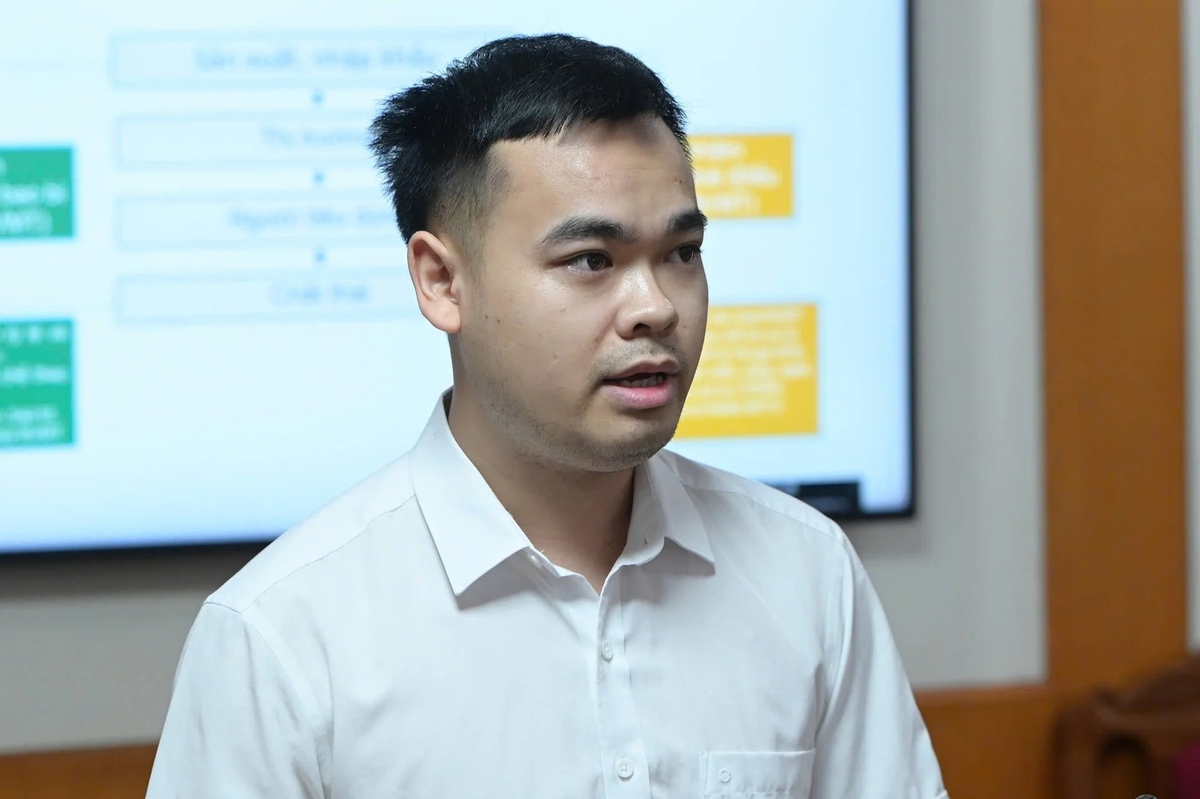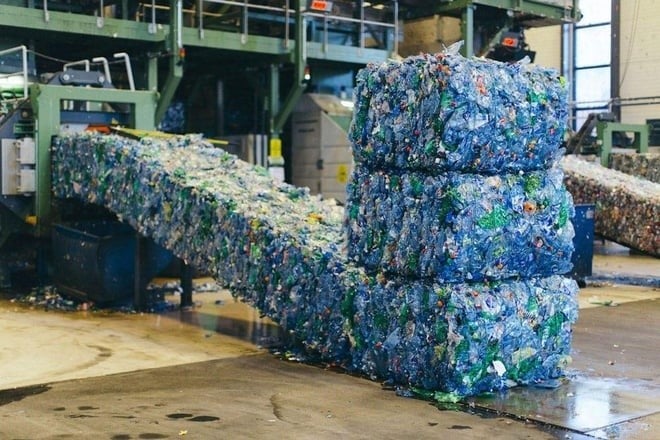November 23, 2025 | 13:28 GMT +7
November 23, 2025 | 13:28 GMT +7
Hotline: 0913.378.918
November 23, 2025 | 13:28 GMT +7
Hotline: 0913.378.918
According to the content about extended producer responsibility (EPR), which was fully stipulated in the Law on Environmental Protection 2020, extended producer responsibility (EPR) is an environmental policy that requires producing and importing businesses to collect, process, or make financial contributions to recycle products and packaging that they have brought to the market.

Mr. Nguyen Van Phan, EPR Office, emphasized that the full and timely declaration of recycling and waste treatment responsibility is a mandatory requirement for businesses. Photo: Tung Dinh.
Before specific regulations on extended producer responsibility (EPR) were issued, most of the packaging after use was discharged directly into the environment. However, when Vietnam promoted the circular economy model, especially since the Law on Environmental Protection 2020 took effect, producers and importers have been forced to recycle or make financial contributions to the Environmental Protection Fund.
"One of the important changes of Decree No. 05/2025/ND-CP newly issued is the clear stipulation on excluding EPR liability for some groups of packaging producers and importers. Including producers and importers with sales revenue from products belonging to the packaging group of less than VND 30 billion/year," said Mr. Nguyen Van Phan, EPR Office.
Specifically, according to Decree No. 05/2025/ND-CP newly issued, the responsibility of producers and importers is divided into two contents. For recycling responsibility, producers of tires, lubricants, batteries, accumulators, and some types of packaging are responsible for recycling from January 1, 2024. Producers and importers of electrical and electronic products are responsible for recycling from January 1, 2025; and producers and importers of transport vehicles are responsible for recycling from January 1, 2027.
For the responsibility of collecting and treating waste, producers and importers of disposable battery products, diapers, gum, tobacco, some synthetic plastic products, and pesticide packaging are responsible for collecting and treating waste from January 1, 2022. Packaging, rechargeable batteries, accumulators, lubricants, tires, electrical and electronic products, and transport vehicles are in the category of mandatory EPR contribution. In particular, packaging producers and importers are mainly affected.
In addition, Decree No. 05 also stipulates the mandatory recycling rate, which is the rate of minimum product and packaging volume that must be collected and recycled according to the compulsory recycling specifications in the implementation year. The Ministry of Agriculture and Environment will gradually increase this rate every 3 years.

Businesses need to understand the EPR regulations to perform the responsibility of recycling and treating packaging and products after use in accordance with the roadmap.
The business's financial contribution to the Environmental Protection Fund is determined by the formula F = R x V x Fs, in which R is the mandatory recycling rate; V is the amount of product and packaging brought to the market; and Fs is the recycling cost norm. Fs is revised under Circular No. 07/2025/TT-BTNMT dated February 28, 2025. For example, as for paper and carton packaging, Fs is 1.938; as for aluminum packaging, Fs is 2.448; and as for iron and other metal packaging, Fs is 3.672.
"Businesses pay attention to declaring and sending the declaration of financial contributions to support waste treatment on the national EPR information system. At the same time, declaring according to the amount of manufactured and imported products and packaging launched to the market in the previous year," said the representative of the EPR Office.
The spirit of Decree No. 05 is to strengthen and promote the circular economy. Therefore, the cost of recycling soft multiple materials will be higher. If the business has materials and packaging belonging to the transfer area between the two circulars, it is necessary to fully declare them according to both items (soft single and multiple materials). But the cost will be paid at a higher level, according to the new regulations.
The specification of the group of businesses exempted from EPR liability not only removes problems for small businesses but also contributes to encouraging cleaner production, reducing cost pressure, and promoting the roadmap for executing the circular economy in Vietnam.
According to the Law on Environmental Protection, starting from 2024, producers and importers must carry out their responsibility for recycling products and packaging. To do this, businesses can choose to organize the recycling of products and packaging or contribute to the Vietnam Environment Protection Fund.
Translated by Thu Huyen

(VAN) Viet Nam’s forestry sector is undergoing a comprehensive transformation, strengthening management, protection, and development efforts to maintain ecological security and drive green, sustainable growth.

(VAN) Viet Nam is accelerating efforts to digitize reservoir operations, from real-time data to hydraulic modelling.
/2025/11/21/3348-2-102623_454.jpg)
(VAN) National Assembly delegate Nguyen Thi Lan has proposed adding special mechanisms to attract human resources to the agricultural, forestry, and fishery sectors, addressing the shortage of high-quality personnel.

(VAN) Over the past two decades, the unified legal framework for water resource management has been perfected, becoming a crucial foundation for ensuring national water security.

(VAN) The land-data cleansing campaign in Dien Bien is entering its final stretch, yet weak infrastructure, limited personnel and fragmented multi-period datasets continue to create major obstacles.
/2025/11/20/0204-2-115235_496.jpg)
(VAN) Not only do carbon credits bring a great revenue source, but they also contribute to better forest protection and development. However, this potential remains largely untapped.

(VAN) Applying modern technology is helping environmental monitoring and oversight of management quality.